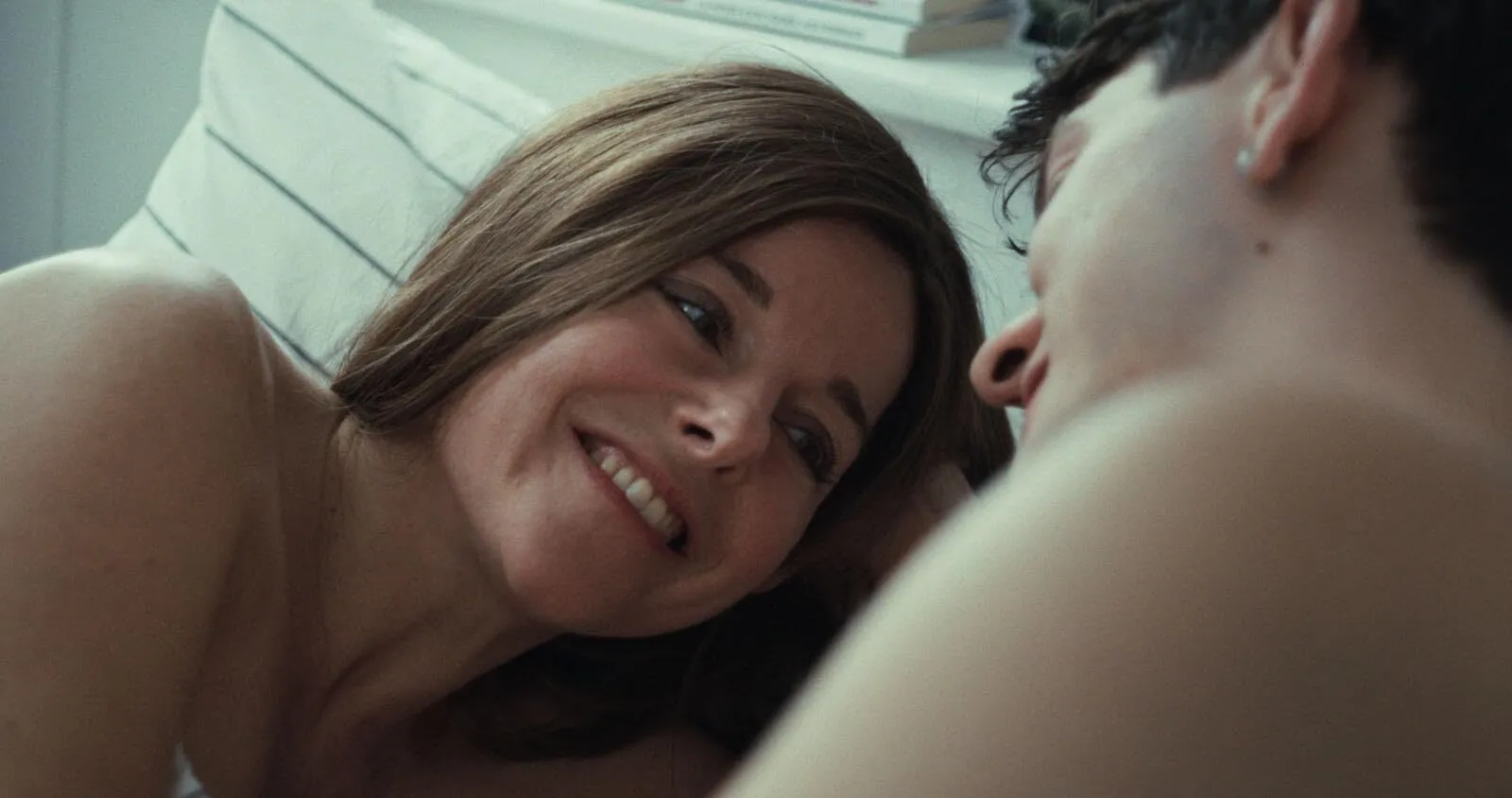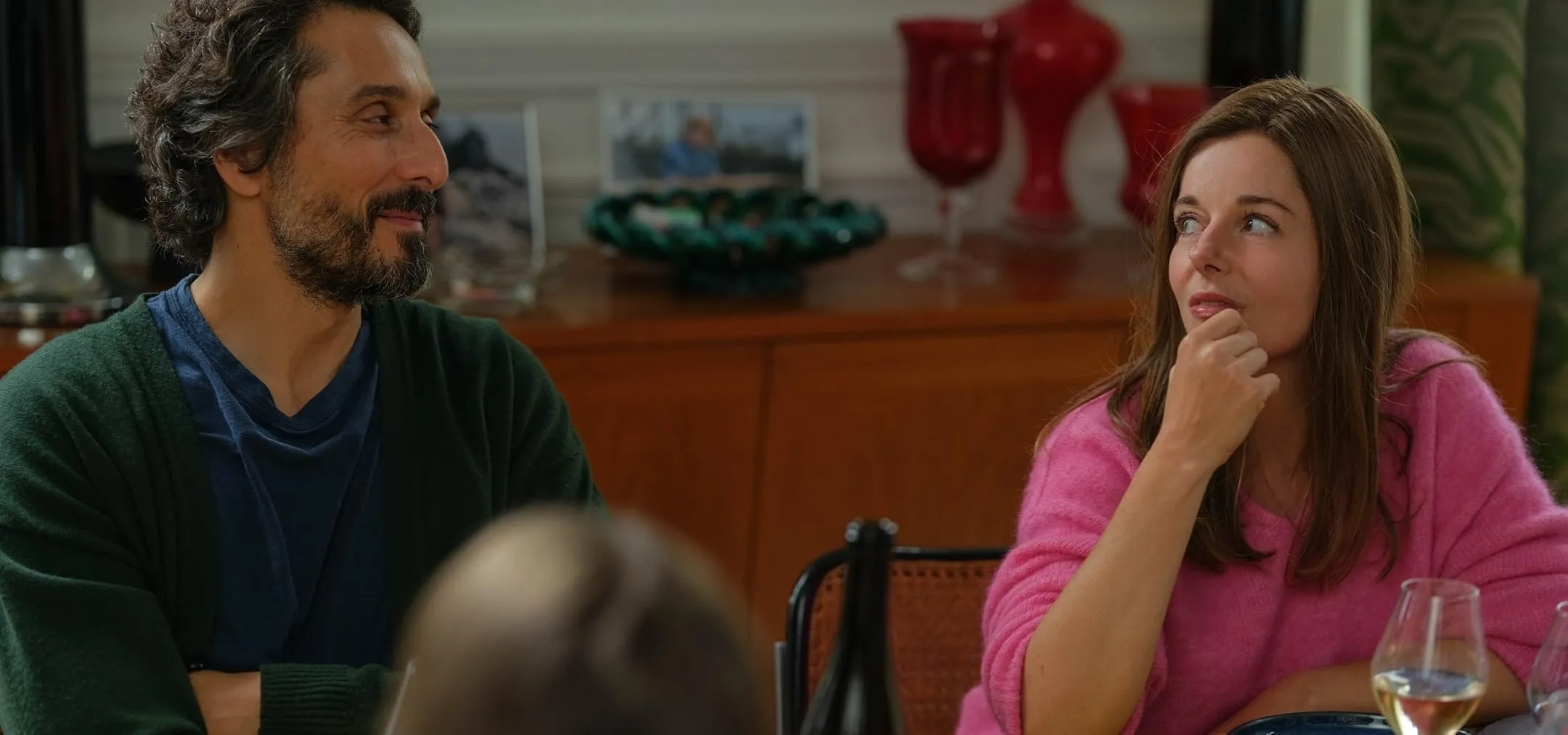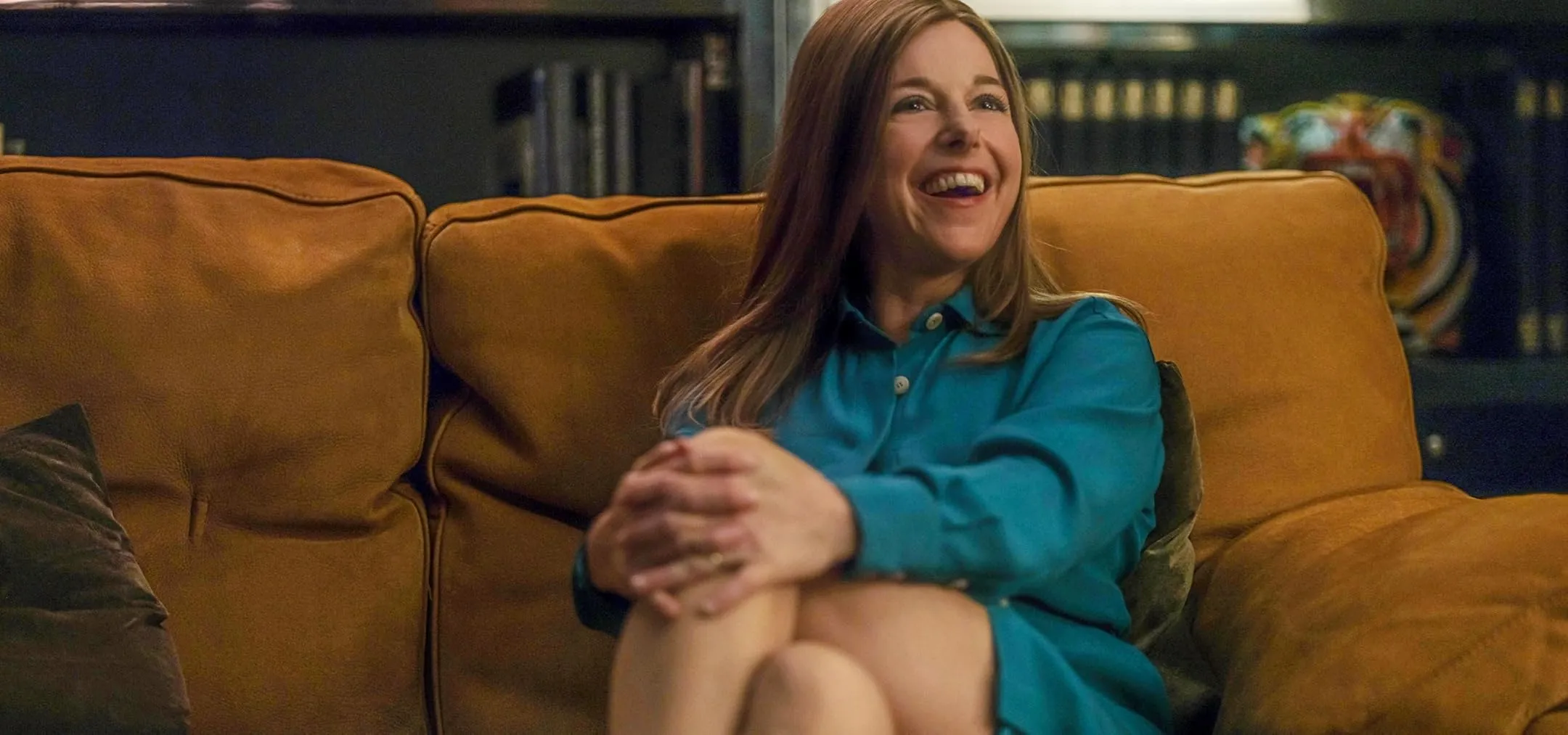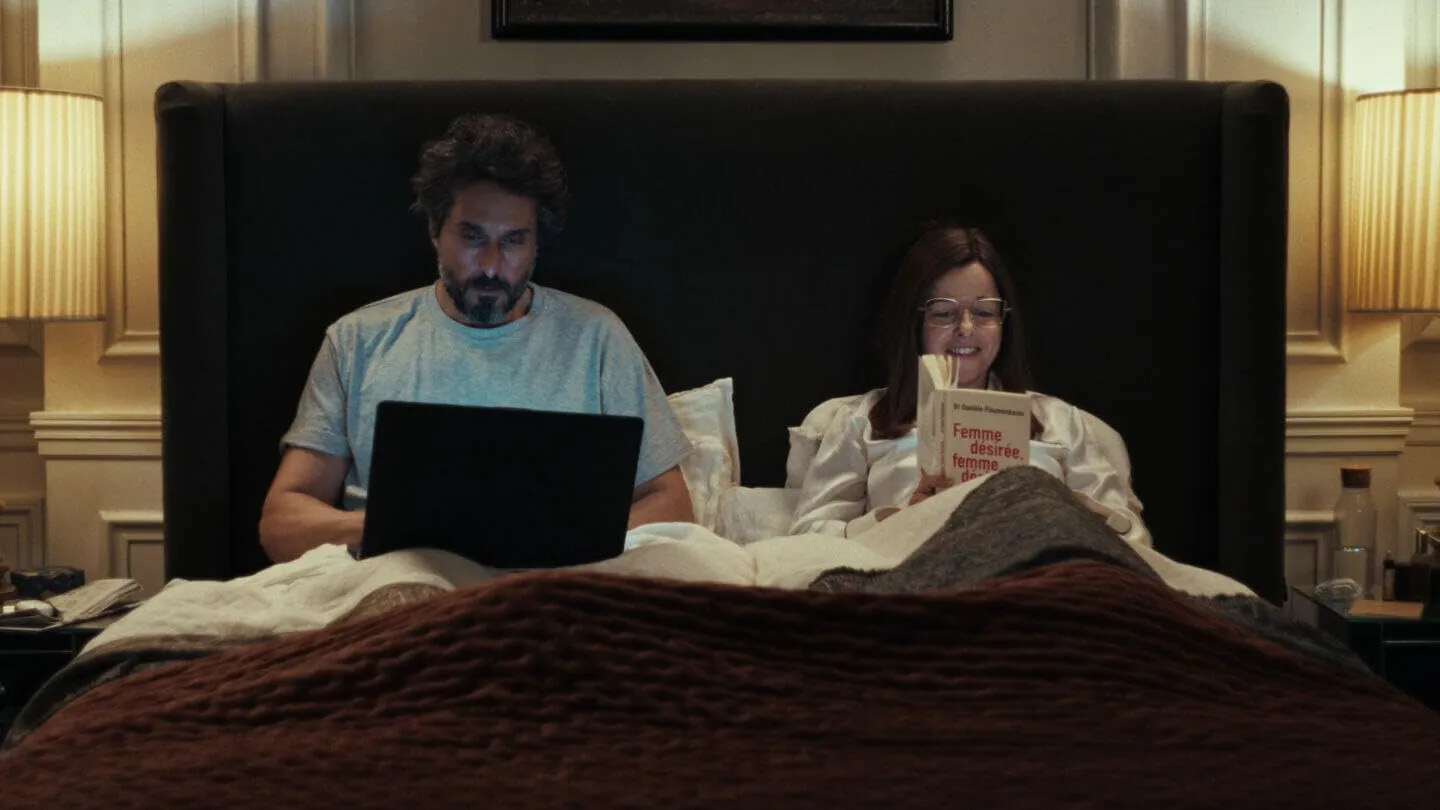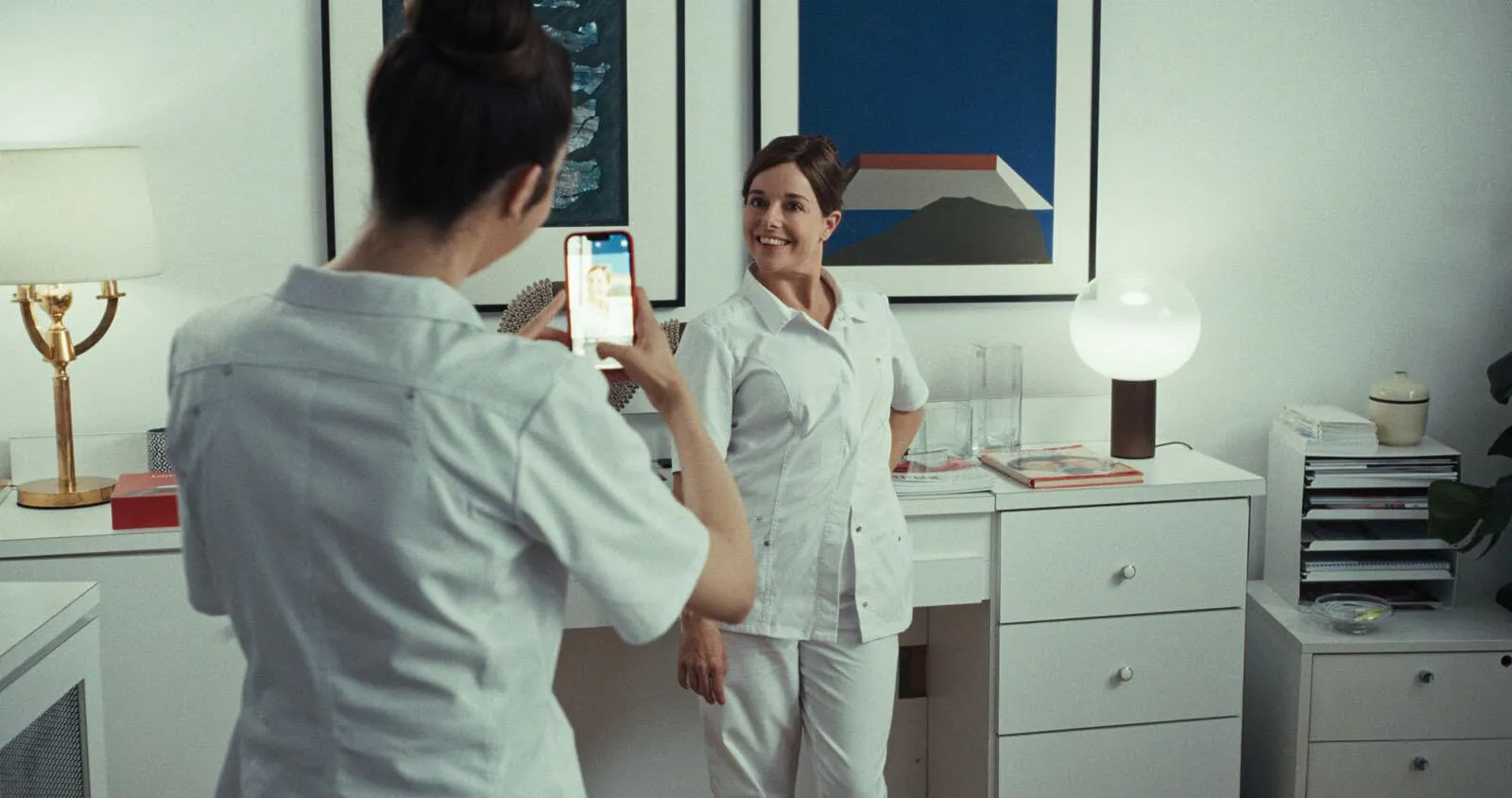Caroline Vignal’s It’s Raining Men follows Iris (Laure Calamy), a Parisian dentist whose stagnant marriage propels her into a whirlwind of app-driven dalliances, blending cheeky humor with poignant introspection.
The film’s premise—middle-aged desire clashing with marital complacency—echoes the French tradition of treating infidelity as a nuanced exploration of human complexity rather than a moral failing. Vignal situates this tale within a cultural landscape where Anglo-American audiences might demand judgment, yet here, the focus remains on Iris’s liberation.
The script nods to classics like Breathless in its breezy defiance of narrative rigidity, though Vignal swaps Godard’s frenetic jump cuts for lush, surreal detours, such as a spontaneous musical sequence set to the titular anthem.
This juxtaposition of grounded realism and whimsical escapism mirrors France’s ambivalence toward tradition and modernity—a tension as relevant in today’s #MeToo era as it was in the heyday of the Nouvelle Vague.
Vignal’s genre-blurring approach—part rom-com, part character study, part surreal fantasia—recalls the playful structural experimentation of Noah Baumbach’s lighter work, infused with a distinctly Gallic shrug toward taboos.
The film’s rhythm is infectious: rapid-fire dating app swipes contrast with languorous post-coital reveries, while composer Camille’s jazzy score (think Amélie meets Aguirre, the Wrath of God ) underscores moments of both levity and longing.
Editing choices—sharp cuts during farcical mishaps, dreamy dissolves in introspective scenes—mirror Iris’s oscillation between chaos and clarity. Unlike mainstream Hollywood fare, which might sanitize her journey, Vignal lets ambiguity linger, much like the unresolved chords in a Miles Davis solo.
The result is a film that feels both effervescent and intellectually nourishing, a testament to cinema’s power to reframe societal conversations—one flirtatious text message at a time.
Narrative Rhythms and Cultural Cadences: How It’s Raining Men Dances Between Desire and Domesticity
Iris, a dentist in her late 40s, drifts through a marriage devoid of physical intimacy, her life a quiet routine of family and work. A chance conversation with an osteopath—casually suggesting she explore a dating app for married individuals—ignites a spark of curiosity.
Here, director Caroline Vignal echoes the breezy provocations of French New Wave, where mundane moments (a dental chair, a stiff neck) become catalysts for existential rebellion. The film’s opening scenes, framed with crisp, sunlit realism, contrast sharply with the surreal energy Iris soon unleashes, mirroring the tension between societal expectations and personal yearning.
As Iris navigates the app’s dizzying array of profiles, the narrative adopts an episodic rhythm, each dalliance a vignette of self-discovery. Vignal avoids linear predictability, instead weaving encounters that oscillate between awkward humor and poignant vulnerability.
A standout sequence—a post-coital musical fantasy set to the titular song—bursts with Technicolor vibrancy, its choreography (reminiscent of Jacques Demy’s The Umbrellas of Cherbourg ) transforming Parisian streets into a stage for middle-aged liberation.
Meanwhile, Iris’s crumbling professional life (her exasperated assistant Nuria becomes a comedic Greek chorus) underscores the cost of her secret double life. The film’s editing here is playful, juxtaposing clandestine texts with dental drills, laughter with longing.
The film’s climax refuses tidy resolution. Iris’s affairs don’t “fix” her marriage but instead force a quiet reckoning. A late-night conversation with Stéphane, shot in lingering close-ups, channels the raw intimacy of Maurice Pialat’s domestic dramas, their emotional disconnect echoing through whispered confessions. The finale, hinting at reconciliation without guarantees, mirrors the unresolved chords of a jazz improvisation—satisfying yet open-ended.
Vignal’s choice to prioritize emotional truth over narrative closure feels daringly modern, a nod to contemporary audiences weary of pat answers. Like Noah Baumbach’s Marriage Story , it asks: Can love evolve without fireworks? It’s Raining Men suggests it can, even as it dances with the thrill of temporary chaos.
Character Dynamics and Cultural Resonance
Laure Calamy’s Iris is a masterclass in balancing whimsy and depth, evoking the spirited complexity of Jeanne Moreau in Jules and Jim —a character both liberated and adrift.
As a dentist whose marital stagnation mirrors her midlife ennui, Iris isn’t merely a protagonist but a cultural lightning rod. Her foray into casual encounters via a dating app—a nod to modern tech’s reshaping of desire—transcends the typical midlife crisis narrative.
Calamy imbues her with a magnetic vulnerability, her laughter masking the ache of invisibility familiar to anyone who’s felt culturally sidelined due to age or gender. The film’s surreal musical interlude, where she dances through Paris to a French rendition of “It’s Raining Men,” isn’t just stylistic flair; it’s a visceral metaphor for her reclamation of agency, her body language shifting from tentative to triumphant.
Stéphane (Vincent Elbaz), Iris’s husband, is a study in passive complacency—a man whose emotional absence is as palpable as his physical presence.
His obliviousness to Iris’s turmoil (highlighted in a quietly devastating scene where she tries, and fails, to articulate her needs) reflects a societal failure to confront marital stagnation with honesty.
Meanwhile, Nuria (Suzanne De Baecque), Iris’s exasperated assistant, serves as both comic relief and moral counterweight. Her eye-rolls and sarcastic quips (“Another root canal and a secret rendezvous?”) ground the film’s flights of fancy, underscoring the chaos Iris leaves in her wake.
The daughters, Margot and Joséphine, act as generational foils. Their pragmatic attitudes toward sex and relationships (“Mom, isn’t this just…basic ?”) contrast sharply with Iris’s reckless exploration, highlighting a cultural divide: where older generations grapple with suppressed desire, younger ones navigate intimacy with a clarity that feels almost alien. Together, these characters form a mosaic of modern relationships, blending Godard-esque irony with the warmth of a Rohmerian moral tale.
Themes and Messages
Caroline Vignal’s It’s Raining Men dismantles the myth that desire dims with age, framing Iris’s sexual reawakening as an act of rebellion against societal erasure. Laure Calamy’s physicality—her unapologetic sensuality, the way the camera lingers on her laughter-lines and curves—echoes Agnès Varda’s celebration of lived-in bodies in Vagabond .
The film’s audacious musical sequence, set to the titular anthem, isn’t just a stylistic flourish; it’s a defiant rejection of invisibility, with Iris surrounded by dancers of varying ages and body types, all claiming space in a world that often sidelines them.
This sequence, drenched in saturated hues and rhythmic editing, mirrors the euphoria of reclaiming agency, much like the dance breaks in Jacques Demy’s Umbrellas of Cherbourg —but with a cheeky, modern edge.
The film sidesteps moralizing about infidelity, instead presenting it as a symptom of stagnation—a tension heightened by its Franco-centric lens. While Anglo-American narratives often frame adultery as catastrophic, Vignal treats it as a messy, human detour, akin to the ambling romances in Rohmer’s Six Moral Tales .
Iris’s marriage to Stéphane (Vincent Elbaz) isn’t villainized but rendered with anthropological curiosity: their disconnect stems from a culture that prioritizes practicality over passion.
A standout scene, shot in a single lingering take, sees Iris pleading for “more” while Stéphane stares blankly—a visual metaphor for the chasm between emotional and physical intimacy. The film’s refusal to villainize either party feels radical, echoing the moral ambiguity of Mia Hansen-Løve’s work.
Iris’s journey mirrors the quiet revolutions of middle-aged women in cinema, from Diane Keaton’s Annie Hall to Greta Gerwig’s Lady Bird (if Gerwig’s protagonist had a libido). Her liberation isn’t without cost: missed family dinners, strained friendships, and a growing addiction to validation (her buzzing phone becomes a ticking time bomb).
Vignal contrasts Iris’s vibrant escapades—shot with a roaming, almost documentary-like camera—with the muted blues and static frames of her domestic life, visually underscoring the trade-offs of her freedom.
Yet the film never fully resolves this tension, leaving us to ponder whether self-discovery demands collateral damage—a question as unresolved as the lingering close-up of Iris’s conflicted smile in the final frame.
Direction and Filmmaking Techniques
Caroline Vignal’s direction thrives on playful juxtaposition, weaving surrealism into the fabric of everyday life. The post-coital musical sequence—a vibrant, rain-soaked dance to the titular song—isn’t just a whimsical detour but a bold visual metaphor for Iris’s liberation.
Shot in saturated hues, the scene mirrors the uninhibited joy of rediscovery, echoing the chromatic daring of Godard’s Contempt but with a cheeky modern twist.
Elsewhere, Vignal contrasts sterile dental office whites and muted domestic tones with bursts of color in Iris’s clandestine encounters, subtly underscoring her shift from repression to radiance. The camera lingers on Calamy’s expressive face, framing her as both protagonist and observer, a technique reminiscent of Truffaut’s focus on character interiority.
The film’s episodic structure—vignettes of Iris’s romantic misadventures—echoes the rhythm of a jazz improvisation, each encounter a riff building toward emotional crescendo.
Vignal avoids linear predictability, instead letting scenes breathe with loose, observational pacing that recalls Noah Baumbach’s Frances Ha . Moments of slapstick (a botched tryst, Nuria’s exasperated glares) collide with quiet introspection (Iris’s vulnerable confessions to Stephane), creating a rhythm that feels both spontaneous and carefully composed.
This balance mirrors the film’s cultural thesis: middle-aged desire isn’t a punchline but a prism through which to refract marital stagnation and societal taboos. The lack of tidy resolution feels intentional, a nod to French cinema’s comfort with ambiguity over Anglo-American moralism—a choice as refreshing as it is culturally resonant.
Performances
Caleb Anderson’s lens zeroes in on how acting choices can elevate a film’s cultural commentary, much like Jeanne Moreau’s magnetic presence in Jules and Jim anchored its exploration of love’s chaos. Here, Laure Calamy’s performance as Iris is a masterclass in balancing whimsy and weight, echoing the French New Wave’s embrace of flawed, vibrant protagonists.
Calamy infuses Iris with a radiance that makes her journey—from marital stagnation to clandestine exploration—feel both joyous and deeply human. Her physicality is key: note the scene where she pratfalls into a chair mid-flirtation, a slapstick moment that morphs into vulnerability as her smile falters, revealing the loneliness beneath the laughter.
This duality mirrors the film’s tonal tightrope, blending Godard-esque spontaneity with Gerwig’s knack for mining humor from existential angst. Calamy’s chemistry with her phone screen (a silent co-star) is equally compelling, her thumb swipes and stifled grins painting a poignant portrait of desire in the digital age.
Vincent Elbaz’s Stephane is a study in quiet resignation, his performance echoing the minimalist restraint of Maurice Ronet in Elevator to the Gallows . His distracted nods during Iris’s attempts at conversation speak volumes about marriages that drift into parallel lives.
Meanwhile, Suzanne De Baecque’s Nuria steals scenes with her exasperated glares, particularly in the dental clinic sequence where her masked sighs—audible despite PPE—add levity while underscoring the collateral damage of Iris’s escapades.
The daughters (Zoé Crepieux and India Hair) serve as subtle generational foils, their Gen Z pragmatism clashing with Iris’s rediscovered hedonism in ways that nod to contemporary debates around sexuality and agency.
Caleb might draw parallels to Noah Baumbach’s ensemble work, where supporting players crystallize a film’s themes without grandstanding. Here, each performance feels like a brushstroke in a larger portrait of modern love—messy, multifaceted, and defiantly alive.
Narrative Playfulness and Cultural Resonance in It’s Raining Men
Caroline Vignal’s It’s Raining Men deftly balances cheeky humor with introspection, structuring Iris’s journey as a series of loosely connected escapades that mirror her emotional awakening.
The film avoids linear predictability, instead opting for vignettes that highlight her evolving desires—think Rohmer’s moral ambiguity meets Frances Ha ’s breezy tone. Vignal’s script sidesteps judgment, framing infidelity as a mundane rebellion rather than a scandal, a choice that feels distinctly French in its refusal to villainize.
Culturally, the film challenges stale tropes about middle-aged women’s sexuality. Iris’s musical fantasy—a raucous, body-positive reimagining of the titular song—echoes Agnès Varda’s playful feminism, celebrating imperfections in a world obsessed with youth.
The cinematography juxtaposes sunlit domesticity with the vibrant chaos of her secret life, while the soundtrack’s jazz-infused rhythms mirror her emotional improvisation.
As a critic who adores how French New Wave directors like Truffaut blend whimsy with depth, I appreciated Vignal’s light touch.
The film’s indie spirit shines in its character-driven beats, though it occasionally leans into mainstream rom-com tropes (hello, third-act marital reconciliation). Yet Calamy’s performance—warm, messy, magnetic—anchors it all, proving that stories about desire don’t need grand stakes to resonate.
Technical flourishes, like the surreal post-coital glow sequences, elevate the material, though the film’s breeziness sometimes undercuts its potential emotional weight. Still, it’s a refreshing antidote to Hollywood’s polished portrayals of midlife crises, offering a candid look at longing and self-reinvention without neat resolutions.
The Review
It’s Raining Men
It’s Raining Men is a fizzy, introspective romp that reimagines midlife desire with humor and heart. Laure Calamy’s magnetic performance anchors the film, blending vulnerability and mischief as Iris navigates her sexual reawakening. While its narrative occasionally leans into familiar tropes, the film’s cultural boldness—celebrating imperfect bodies, rejecting shame, and embracing French nonchalance—makes it a refreshing antidote to Hollywood’s polished rom-coms. Vignal’s playful visuals and jazz-infused rhythms elevate the material, though the resolution feels slight. A breezy, body-positive charmer that prioritizes joy over judgment.
PROS
- Laure Calamy’s charismatic, nuanced performance anchors the film.
- Playful tone balances humor with introspection about middle-aged desire.
CONS
- Predictable narrative trajectory (marital reconciliation feels underexplored).
- Supporting characters (e.g., husband, daughters) lack depth.









































